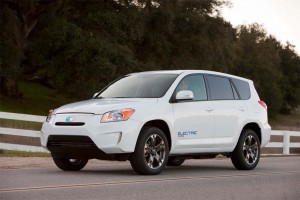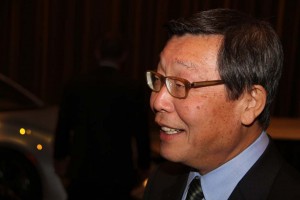With what one jealous competitor once described as “more money than god” in its treasury, Toyota has traditionally been a company that liked to keep things in-house. Even when it worked with outside suppliers it focused on those within its extended family, or keiretsu.
“Toyota was one of the companies that liked to do things its own way,” noted Yoshi Inaba, President and COO of Toyota Motor North America.
But that strategy is shifting fast, the senior executive acknowledged during an appearance at the Chicago Auto Show. In a subsequent conversation with TheDetroitBureau.com, Inaba hinted there could be a “lot more” joint ventures to come in the near future.
The maker has already lined up a number of high-profile partners – ranging from Microsoft to Intel, as well as traditional competitors, such as Ford and BMW. In many cases, this reflects the changing nature of the auto industry, which is facing a need to ramp up its focus on high technology. But it also suggests that Toyota might be paying the price for past hubris, thinking it could do everything on its own.
Ironically, that’s especially true in the area of battery power. While the maker was one of the first to market with a hybrid-electric vehicle – its Prius model today generating about half the hybrid segment’s sales – Toyota was late to the party when it came to lithium-ion-powered plug-ins and battery-electric vehicles, noted Aaron Bragman, an analyst with IHS Automotive.
“They’re going to need to do a whole lot of high-tech spending and, in some cases, like lithium-ion batteries, Toyota is playing a game of catch-up,” stressed Bragman.
Toyota will launch two battery-electric vehicles this coming year, including the RAV4-EV, a version of its popular crossover-utility vehicle, with a powertrain developed by California-based battery-car start-up Tesla Motors.
Toyota has invested about $50 million in Tesla so far. And it sold the start-up its abandoned assembly plant in Fremont, California – a factory Tesla will use to produce its own new products, such as the Model S sedan and Model X crossover. (For a first look at the Model X, Click Here.)
Toyota has also announced partnerships with BMW and Ford to help develop alternative powertrain technologies. The alliance with the U.S. maker will focus on battery-based drivelines for big SUVs and pickups.
In his conversation with TheDetroitBureau.com, Toyota NA President Inaba said the alliances the maker is focusing on fall into three distinct categories:
- Manufacturing, such as the alliance with Subaru, which is using some of the excess capacity at its own North American assembly plant to produce Toyota Camry sedans for the U.S. market;
- Engines, notably those based on alternate technologies, such as the lithium-ion drivetrain Tesla will supply for the RAV4; and
- High-tech hardware and software, such as EnTune infotainment systems Toyota recently launched in a bid to challenge competitors, such as Ford, with its popular Sync system.
The Microsoft and Intel alliances will put a particular focus on coming up with safe, voice-operated technologies that can avoid creating driver distractions, the executive noted.
When reminded that Toyota has traditionally steered clear of partnerships, especially with competitors like Ford and BMW, Inaba responded times have changed. Even with its deep pockets, Toyota has come to realize, “No one can handle it all by themselves.”
Of course, Toyota is by no means alone. Indeed, it’s hard to find a manufacturer that hasn’t set up a series of partnerships, some broad like the Renault-Nissan Alliance, while others are more limited, such as the relationship between Renault, Nissan and Daimler. The German maker has set up a series of small projects with the Euro-Japanese Alliance, including one that will see a Mercedes-Benz platform used for a new Infiniti luxury model, the Etherea.
“We’re going to see even more of these going forward,” stressed analyst Bragman.



Quote from the article
“The Microsoft and Intel alliances will put a particular focus on coming up with safe, voice-operated technologies that can avoid creating driver distractions, the executive noted.”
The world was thrilled, last year, with the millions of US$ Bill Gates (Microsoft) invested on the OPOC engine of EcoMotors.
Is there any result, yet?
Specific lubricant consumption?
Any numbers, yet?
Did they find any advantage of the OPOC over the PatOP ( http://www.pattakon.com/pattakonPatOP.htm ) engine ?
Thanks
Manousos Pattakos